About the modern Pancake week with us, we talked. On Maslenitsa-Carnival of other peoples, also briefly ran. And they found out that Maslenitsa and Cheese Seven different holidays.
In this article, there are also difficulties in translating the ком-bear, ком-lump (com, kom) and other words connected with the sound of words ....
Today we go further into the depths of centuries. Carnival as a holiday arose, most likely, in the middle of the 16th century and its appearance was influenced by the church reform carried out at that time by Patriarch Nikon.
According to the popular, to date, version of Maslenitsa is the former Komoditsa. The statement is true only in part, and from a small part and not one.
Kom lives in Siberia -
The edge of the "noisy", -
In eternal abundance,
Permafrost.Through the forests of Riphea
Who will scream: -
Come soon -
I cry with a pancake!
- Vladimir Burov *
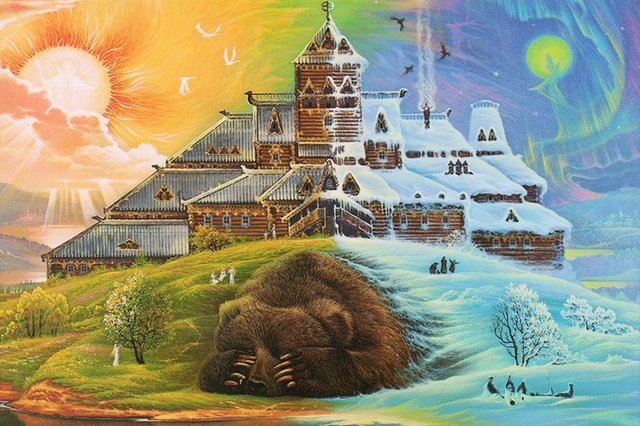
KOMOEDITSA (or Komoeditsy) - one of the oldest great Slavic pagan holidays; in addition to the main meaning of the holy holiday of the meeting of the spring and the beginning of the New Year, granted by the sky, also had the character of veneration of the Bear God.
This is probably the most accurate description of the holiday from the Internet.
Let's pay attention to the plural "Komoeditsy". This holiday was celebrated not only at the end of winter, but also at the beginning. Although in due course there was only a spring holiday. This is the first significant difference from Maslenitsa. The second is the presence in the ritual of a bear, which is very rare in the Carnival, and occupies the main place in Komoeditsy. After all, the holiday is named after him. In honor of Coma.
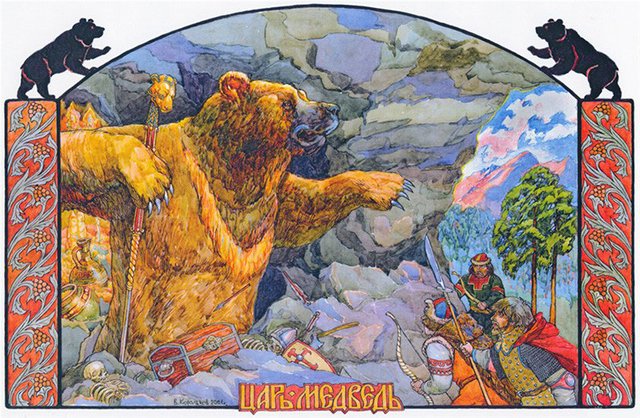
Kom is one of the bear's names among the Slavs. There is a popular version that the modern name of the beast, the bear, is allegorical, and the "real" name "Kom" can not be pronounced aloud, so as not to invoke accidentally.
In fact, this is a decent stupidity with a share of truth. Kom's name is the usual bear's name for the Slavs, like Bear, Ber, Shaggy, Mishka, Mishutka, Toptygin. And the truth is that, really, the real name of the one in honor of whom the holiday was arranged could not be pronounced. For the mention of "Volan de Mort" pagan gods, and more specifically, the mention of Veles, the Christian church on the head would not stroke. How the bear and Veles are connected, we already knew.
From the name of the bear - "com", some modern words and expressions have occurred. For example, the names of the bearberry - komanyk, it is also a blackberry. Morokka is otherwise called komanytsya. And the expression "fall into a coma ", "comatose state" is identical to the bear hibernation in the den. By the way, and the word "берлога (lair)*, too, from one of the names of the bear - " логово медведя (bear lair) "
Holiday Komoeditsa, like Pancake week, passed in a certain order of action.
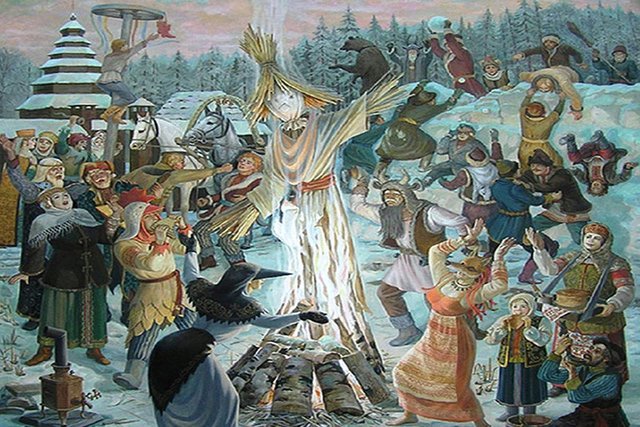
As well as Maslenets, they first prepared for the celebration, built snow slides, fortresses, and made a scarecrow of Morena.
In contrast to Pancake week, pagan names can still be traced and it becomes clear what was burned in nothing innocent and to no one unknown Shrovetide. The burning of the goddess Mary (the goddess of Winter and Death) symbolized the end of winter and the victory of a new life over death, because all nature was already beginning to resurrect around.
Services were held on Kapischa in honor of Yaril-Sun. They brought in general requests. We spent trizna to the glory of our ancestors. Virgins clicked, they called for spring.
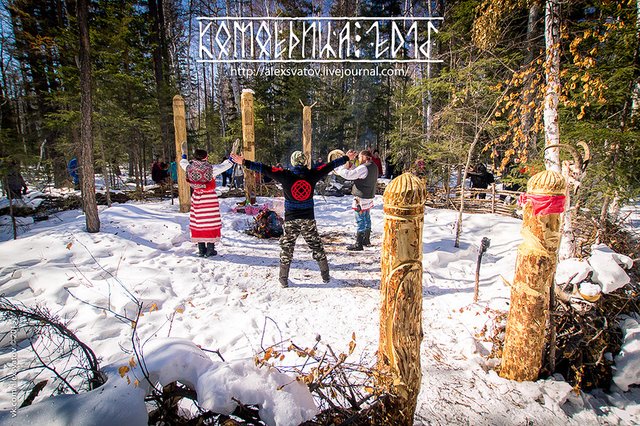
Then came the games: the capture of a snow fortress, guarded by masquerades of servants Navi, servants of Morena -Mara, While the fortress does not fall - in the spring there will be no progress ...
"Go away, Winter is cold! Come, Summer is hot! With a painful time, with flowers, with grass!"
After a successful assault and capture of the stuffed Morena, it was successfully burned at the stake, throwing garbage, old things and straw into the fire.
"Marena tanned, the whole world bored! "
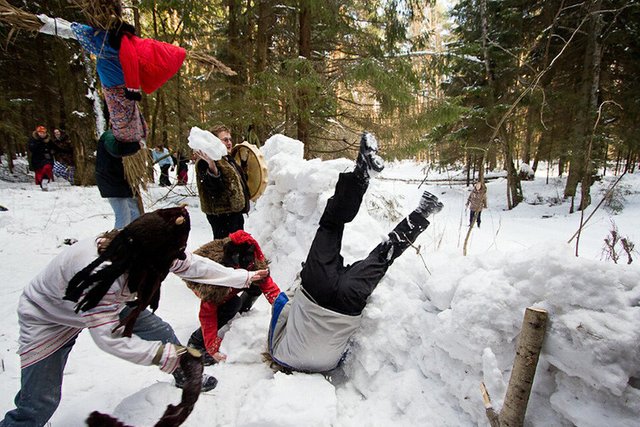
Now it is possible to meet the spring, no evil forces, which in a lot of attempts to prevent the arrival of spring, is no longer a hindrance. Having fallen into the fire wheel, symbolizing the sun, it was lowered from the mountain.
"C mountains roll, with the spring turn around! "
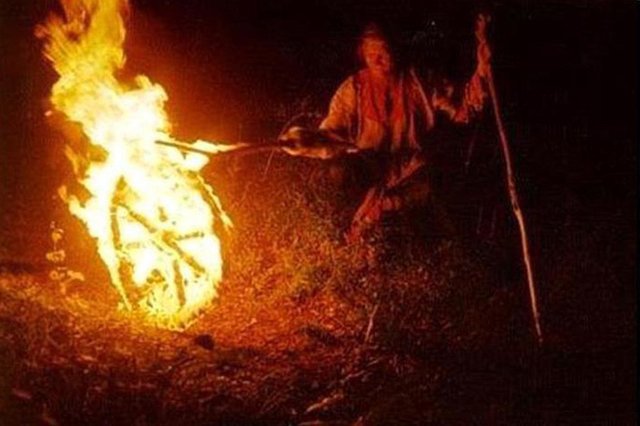
The festivities continued at full speed. The people, picking up the burning buns, go to "wake up" - wake the bear, whom he depicts, dressed in the skins of a mummer, hiding in a den pit. The celebrants begin to dance around the bear round dance, shouting loudly and trying to wake the terrible beast, throwing snowballs into it. But the bear sleeps until one of the beauties sits on his back. And only then the bear wakes up and arranges the pursuit of a girl who escaped from him, taking with him some of his skins. Catching the beauty, which prevented him from sleeping, the bear encloses her in his arms with a bearish grip. This "wake up" ends, and festivities and merrymaking continue smoothly turning into a festive feast.
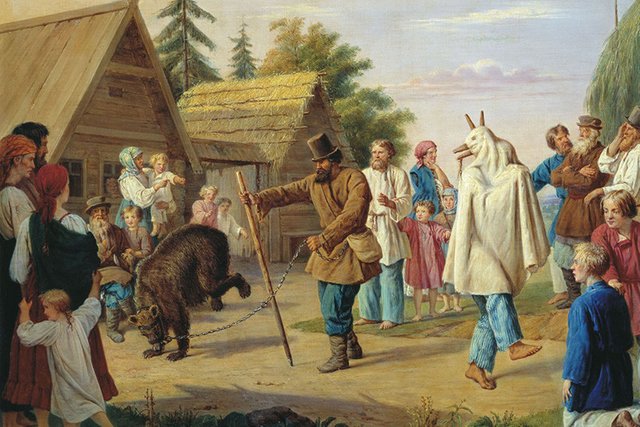
As you can see Komoeditsa is quite different from Maslennitsy, who came to replace it.
But if you think about it, the main elements of the holiday moved from one to another. Both holidays are Spring and Winter greeting. Folk festivities, snow fun and merrymaking are similar. The burning of the Shrove Moraine, although it lost some of the original meaning, remains. A "wake up" clearly transformed into Maslenitsa "flirting" and bride-show.

Let's return to the name "Comedian", from where did it all come from? Before the origin of the word "carnival", we have not reached yet. The usual explanation about the relationship of pancakes with butter, I personally do not like. But while about Komoditsu, about the beginning of "komo -" have already mentioned, from the word "com" - a bear. From here and the proverb -
"The first was a lump" (ком(rus.) - lump)
and rephrasing -
"If the seventh pancake is lumpy ... Fig with them, with pancakes.
But there is a viable version that sounds a bit different - "The first pancake komAm", that is, "The first pancake bears"
The first pancake to comas,
pancake the second - to friends,
the third damn - distant kin,
and the fourth - me
And indeed, in rituals, a bear often feeds and even a bear is honored (a bear is welcome).
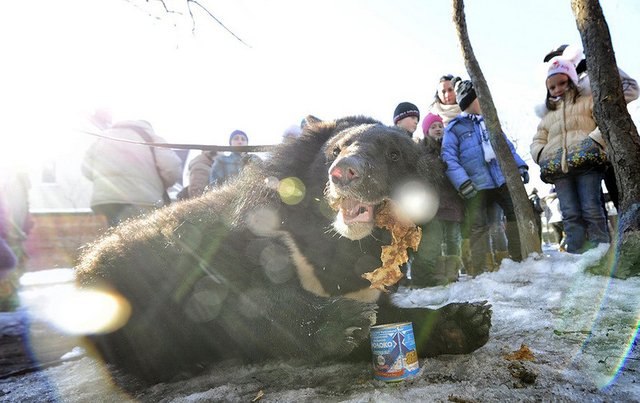
Apparently because of this there is a version that "komedytsa" means "eating comatose," and in different senses. The first is that comas eat pancakes. The second is that there is a special kind of "ritual" pancakes with the name "com", which the bears have postponed. And the third comes from the ritual of the independent "Bear Festival", where there is a ritual of hunting for a bear, its ritual murder, eating it and after the resurrection of an immortal bear soul, that is, literally "eating a bear cub."
And so, Maslenitsa \ is not the Komoditsa. From Komodeytsy in Pancake week is not much left, and what's left, lost its meaning and undergone great metamorphosis, turning in essence Maslenitsa from the "pagan" Orthodox holiday into a national Christian.
On this, the story of the Proto-Maslenitsa-Komodice itself will stop, but since all three versions of etymology do not reflect the essence of the holiday and look rather superficial, the following story is just about the etymology of "Komodetitsy" (the etymology of Shrovetide is postponed)))).
Well, mentioning an independent "bear holiday" populyuryu and say that one single holiday from which went Komoditsa does not exist.
And Komoditsa, although considered a "pagan" holiday, having a "pagan" ritual of glorification of the ancient gods, oddly enough, is a consequence of the emergence of Christianity in Russia.